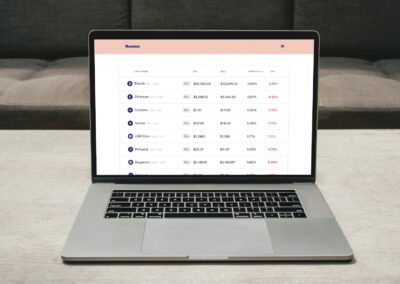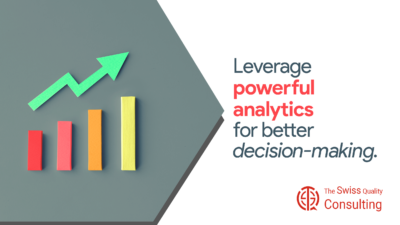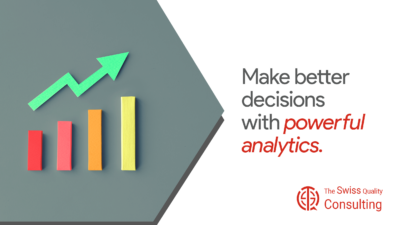Harnessing Business Intelligence for Growth in Saudi Arabia and the UAE
Learn how data-driven decision-making can empower businesses in Saudi Arabia and the UAE to gain valuable insights, optimize operations, and drive growth in the digital age.
In the fast-paced and competitive business landscape of Saudi Arabia and the UAE, making informed decisions is crucial for success. Data-driven decision-making has emerged as a powerful tool, enabling businesses to gain valuable insights, optimize operations, and drive growth. By leveraging data analytics and business intelligence, organizations in the Gulf region can unlock a wealth of opportunities and stay ahead of the curve.
1. Turning Data into Actionable Insights
Data is the lifeblood of modern businesses, but it’s not enough to simply collect it. The key lies in transforming raw data into actionable insights that can guide strategic decision-making. Business intelligence tools and platforms empower organizations to analyze vast amounts of data, uncovering patterns, trends, and correlations that might not be apparent at first glance. These insights can then be used to inform decisions related to product development, marketing strategies, pricing, customer service, and more.
2. Optimizing Operations and Enhancing Efficiency
Data-driven decision-making goes beyond strategic planning; it also plays a crucial role in optimizing day-to-day operations. By analyzing data related to production processes, inventory management, and supply chain logistics, businesses can identify bottlenecks, inefficiencies, and areas for improvement. This allows them to streamline operations, reduce costs, and enhance overall efficiency. For example, a manufacturing company in Saudi Arabia might use data analytics to identify the optimal production schedule that minimizes downtime and maximizes output.
3. Personalizing Customer Experiences and Driving Loyalty
In today’s customer-centric market, understanding and catering to individual preferences is essential for building long-term loyalty. Data analytics enables businesses to gain a deeper understanding of their customers, their behaviors, and their needs. This knowledge can then be used to personalize marketing campaigns, tailor product recommendations, and provide exceptional customer service. A retailer in Dubai might leverage data analytics to send targeted promotions to customers based on their past purchase history, increasing the likelihood of conversion and fostering a sense of loyalty.
4. Mitigating Risks and Identifying Opportunities
The business landscape is constantly evolving, and with change comes risk. Data-driven decision-making empowers businesses to proactively identify and mitigate potential risks. By analyzing historical data and market trends, organizations can anticipate challenges and take preemptive measures to minimize their impact. Furthermore, data analytics can also help businesses identify new opportunities for growth and expansion. For instance, a financial institution in the UAE might use data analytics to assess the creditworthiness of potential borrowers, reducing the risk of default and ensuring the stability of their loan portfolio.
5. Gaining a Competitive Advantage in the Digital Age
In the digital age, where competition is fierce and innovation is rapid, data-driven decision-making has become a key differentiator for businesses. Organizations that embrace data analytics gain a competitive edge by making faster, more informed decisions based on real-time insights. They can quickly adapt to changing market conditions, identify emerging trends, and seize new opportunities before their competitors. This agility and responsiveness are essential for success in today’s dynamic business environment.
6. Building a Culture of Data-Driven Decision-Making
Data-driven decision-making is not just about implementing the right tools and technologies; it’s about fostering a culture where data is valued and used to inform every aspect of the business. This requires a commitment from leadership to prioritize data literacy and invest in training and development programs for employees at all levels. When everyone in the organization understands the importance of data and has the skills to interpret and utilize it effectively, the benefits of data-driven decision-making are amplified.
7. Embracing Artificial Intelligence and Machine Learning
As artificial intelligence (AI) and machine learning (ML) technologies continue to advance, they are increasingly being integrated into business intelligence platforms. AI-powered analytics tools can automate data analysis, identify hidden patterns, and generate predictive insights, further enhancing the capabilities of data-driven decision-making. For example, a logistics company in Riyadh might use AI to optimize delivery routes, reducing fuel consumption and improving overall efficiency.
8. The Future of Data-Driven Decision-Making in the Gulf
The future of data-driven decision-making in Saudi Arabia and the UAE is bright. As businesses continue to embrace digital transformation and invest in data analytics capabilities, they will be well-positioned to thrive in the years to come. With the support of government initiatives aimed at promoting innovation and technology adoption, the Gulf region is poised to become a leader in data-driven decision-making, driving economic growth and prosperity.
#DataDrivenDecisionMaking #BusinessIntelligence #SaudiArabia #UAE #BusinessAnalytics






















